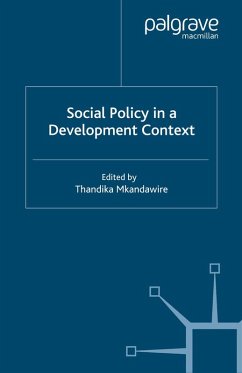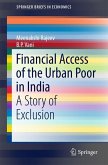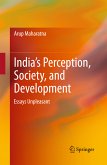Drawing upon both conceptual and empirical evidence, this volume argues the case for the centrality of social policy in development, focusing particularly on the message that social policy needs to be closely intertwined with economic policy. It is argued that social policy can provide the crucial link between economic development poverty eradication and equity. This volume is a significant contribution to thinking about social policy in a development context.
Dieser Download kann aus rechtlichen Gründen nur mit Rechnungsadresse in A, B, BG, CY, CZ, D, DK, EW, E, FIN, F, GR, HR, H, IRL, I, LT, L, LR, M, NL, PL, P, R, S, SLO, SK ausgeliefert werden.
'This important collection challenges the widely accepted dichotomy between economic and social policy, questioning many of the assumptions that inform social policy today. It shows that current preoccupations with individual choice and efficiency can lead to a neglect of more fundamental issues of social protection and resource redistribution. I hope that the book is read extensively by policy-makers as well as academics.' - Frances Stewart, Professor of Development Economics, University of Oxford, UK
'Thandika Mkandawire is to be congratulated on demonstrating the case for development studies scholars to take social policy analysis seriously. This is a path-breaking volume packed with excellent theoretical pieces and comparative case studies that should contribute to the re-emergence of inclusive and equitable social development policies.' - Bob Deacon, Global Social Policy
'Thandika Mkandawire is to be congratulated on pulling together an important collection of original papers on the topic of social policy and development. The contributors to this volume address many diverse aspects of social policy and its relationship to economic development. The book builds on the growing literature on the subject and will be essential reading for anyone working in this challenging field. It makes an important contribution.'- James Midgley, Harry and Riva Specht Professor of Public Social Services and Dean, School of Social Welfare, University of California at Berkeley, USA
'This well edited volume is a must for all concerned with development issues. It demonstrates clearly that the social safety net policy thinking, which has marked mainstream development policies over the last two decades, did not deliver the expected results, indicates also why this thinking was conceptually wrong and provides highly relevant alternative policy solutions. Development students and practitioners would benefit highly from it.' - Rolph van der Hoeven, Manager Technical Secretariat, World Commission Social Dimension of Globalization, ILO
'Thandika Mkandawire is to be congratulated on demonstrating the case for development studies scholars to take social policy analysis seriously. This is a path-breaking volume packed with excellent theoretical pieces and comparative case studies that should contribute to the re-emergence of inclusive and equitable social development policies.' - Bob Deacon, Global Social Policy
'Thandika Mkandawire is to be congratulated on pulling together an important collection of original papers on the topic of social policy and development. The contributors to this volume address many diverse aspects of social policy and its relationship to economic development. The book builds on the growing literature on the subject and will be essential reading for anyone working in this challenging field. It makes an important contribution.'- James Midgley, Harry and Riva Specht Professor of Public Social Services and Dean, School of Social Welfare, University of California at Berkeley, USA
'This well edited volume is a must for all concerned with development issues. It demonstrates clearly that the social safety net policy thinking, which has marked mainstream development policies over the last two decades, did not deliver the expected results, indicates also why this thinking was conceptually wrong and provides highly relevant alternative policy solutions. Development students and practitioners would benefit highly from it.' - Rolph van der Hoeven, Manager Technical Secretariat, World Commission Social Dimension of Globalization, ILO









